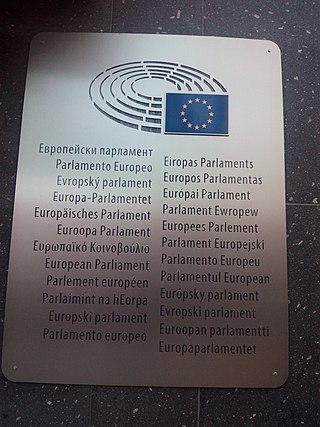
Esperanto is the world's most widely spoken constructed international auxiliary language. Created by the Warsaw-based ophthalmologist L. L. Zamenhof in 1887, it was intended to be a universal second language for international communication, or "the international language". Zamenhof first described the language in Dr. Esperanto's International Language, which he published under the pseudonym Doktoro Esperanto. Early adopters of the language liked the name Esperanto and soon used it to describe his language. The word esperanto translates into English as "one who hopes".

Esperantujo or Esperantio is the Esperanto community; the community of speakers of the Esperanto language and their culture, as well as the places and institutions where the language is used. The term is used "as if it were a country."

Language is a structured system of communication that consists of grammar and vocabulary. It is the primary means by which humans convey meaning, both in spoken and written forms, and may also be conveyed through sign languages. The vast majority of human languages have developed writing systems that allow for the recording and preservation of the sounds or signs of language. Human language is characterized by its cultural and historical diversity, with significant variations observed between cultures and across time. Human languages possess the properties of productivity and displacement, which enable the creation of an infinite number of sentences, and the ability to refer to objects, events, and ideas that are not immediately present in the discourse. The use of human language relies on social convention and is acquired through learning.
An international auxiliary language is a language meant for communication between people from all different nations, who do not share a common first language. An auxiliary language is primarily a foreign language and often a constructed language. The concept is related to but separate from the idea of a lingua franca that people must use to communicate.
Dell Hathaway Hymes was a linguist, sociolinguist, anthropologist, and folklorist who established disciplinary foundations for the comparative, ethnographic study of language use. His research focused upon the languages of the Pacific Northwest. He was one of the first to call the fourth subfield of anthropology "linguistic anthropology" instead of "anthropological linguistics". The terminological shift draws attention to the field's grounding in anthropology rather than in what, by that time, had already become an autonomous discipline (linguistics). In 1972 Hymes founded the journal Language in Society and served as its editor for 22 years.
Sociolinguistics is the descriptive study of the effect of any or all aspects of society, including cultural norms, expectations, and context, on the way language is used, and society's effect on language. It can overlap with the sociology of language, which focuses on the effect of language on society. Sociolinguistics overlaps considerably with pragmatics and is closely related to linguistic anthropology.
The Esperantic Studies Foundation, abbreviatedESF is a non-profit organisation initiated in 1968 by Jonathan Pool, E. James Lieberman and Humphrey Tonkin, with the aim to further the understanding and practice of linguistic justice in a multicultural world, with a special focus on the study of interlinguistics and the role of Esperanto.
Language education – the process and practice of teaching a second or foreign language – is primarily a branch of applied linguistics, but can be an interdisciplinary field. There are four main learning categories for language education: communicative competencies, proficiencies, cross-cultural experiences, and multiple literacies.
Language policy is an interdisciplinary academic field. Some scholars such as Joshua Fishman and Ofelia García consider it as part of sociolinguistics. On the other hand, other scholars such as Bernard Spolsky, Robert B. Kaplan and Joseph Lo Bianco argue that language policy is a branch of applied linguistics.
The term 'minority group' has different usages depending on the context. According to its common usage, a minority group can simply be understood in terms of demographic sizes within a population: i.e. a group in society with the least number of individuals is therefore the 'minority'. However, in terms of sociology, economics, and politics; a demographic which takes up the smallest fraction of the population is not necessarily the 'minority'. In the academic context, 'minority' and 'majority' groups are more appropriately understood in terms of hierarchical power structures. For example, in South Africa during Apartheid, white Europeans held virtually all social, economic, and political power over black Africans. For this reason, black Africans are the 'minority group', despite the fact that they outnumber white Europeans in South Africa. This is why academics more frequently use the term 'minority group' to refer to a category of people who experience relative disadvantage as compared to members of a dominant social group.

The European Union (EU) has 24 official languages, of which three – English, French and German – have the higher status of "procedural" languages of the European Commission. Irish previously had the lower status of "treaty language" before being upgraded to an official and working language in 2007. However, a temporary derogation was enforced until 1 January 2022. The three procedural languages are those used in the day-to-day workings of the institutions of the EU. The designation of Irish as a "treaty language" meant that only the treaties of the European Union were translated into Irish, whereas Legal Acts of the European Union adopted under the treaties did not have to be. Luxembourgish and Turkish, which have official status in Luxembourg and Cyprus, respectively, are the only two official languages of EU member states that are not official languages of the EU.
The Universal Declaration of Linguistic Rights is a document signed by the International PEN Club, and several non-governmental organizations in 1996 to support linguistic rights, especially those of endangered languages. The document was adopted at the conclusion of the World Conference on Linguistic Rights held 6–9 June 1996 in Barcelona, Spain. It was also presented to the UNESCO Director General in 1996 but the Declaration has not gained formal approval from UNESCO.
Communicative language teaching (CLT), or the communicative approach (CA) , is an approach to language teaching that emphasizes interaction as both the means and the ultimate goal of study.
Interlinguistics, as the science of planned languages, has existed for more than a century as a specific branch of linguistics for the study of various aspects of linguistic communication. Interlinguistics is a discipline formalized by Otto Jespersen in 1931 as the science of interlanguages, i.e. contact languages tailored for international communication. In more recent times, the object of study of interlinguistics was put into relation with language planning, the collection of strategies to deliberately influence the structure and function of a living language. In this framework, interlanguages become a subset of planned languages, i.e. extreme cases of language planning.
Anationalism is a term originating from the community of Esperanto speakers. It denotes a range of cosmopolitan political concepts that combine some or all of the following tendencies and ideas:
The Baháʼí Faith teaches that the world should adopt an international auxiliary language, which people would use in addition to their mother tongue. The aim of this teaching is to improve communication and foster unity among peoples and nations. The Baháʼí teachings state, however, that the international auxiliary language should not suppress existing natural languages, and that the concept of unity in diversity must be applied to preserve cultural distinctions. The Baha'i principle of an International Auxiliary Language (IAL) represents a paradigm for establishing peaceful and reciprocal relations between the world's primary speech communities – while shielding them from undue linguistic pressures from the dominant speech community/communities.
A language barrier is a figurative phrase used primarily to refer to linguistic barriers to communication, i.e. the difficulties in communication experienced by people or groups originally speaking different languages, or even dialects in some cases.
Finvenkismo is an ideological current within the Esperanto movement dating back to L. L. Zamenhof, the initiator of Esperanto. The name is derived from the concept of a fina venko denoting the moment when Esperanto will be used as the predominant second language throughout the world. A finvenkist is thus someone who hopes for or works towards this "final victory" of Esperanto. According to some finvenkists, this "final victory" of Esperanto may help eradicate war, chauvinism, and cultural oppression.
Linguistic rights are the human and civil rights concerning the individual and collective right to choose the language or languages for communication in a private or public atmosphere. Other parameters for analyzing linguistic rights include the degree of territoriality, amount of positivity, orientation in terms of assimilation or maintenance, and overtness.
English as a lingua franca (ELF) is the use of the English language "as a global means of inter-community communication" and can be understood as "any use of English among speakers of different first languages for whom English is the communicative medium of choice and often the only option". ELF is "defined functionally by its use in intercultural communication rather than formally by its reference to native-speaker norms" whereas English as a second or foreign language aims at meeting native speaker norms and gives prominence to native speaker cultural aspects. While lingua francas have been used for centuries, what makes ELF a novel phenomenon is the extent to which it is used in spoken, written and in computer-mediated communication. ELF research focuses on the pragmatics of variation which is manifest in the variable use of the resources of English for a wide range of globalized purposes, in important formal encounters such as business transactions, international diplomacy and conflict resolution, as well as in informal exchanges between international friends.




